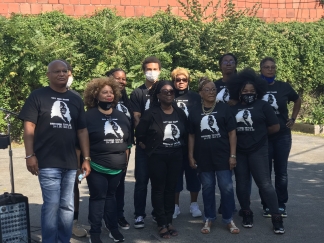news article
Lincoln UMC’s bold health equity ministry
February 2, 2021 / By Shannon Hodson / .(JavaScript must be enabled to view this email address)
Editor's Note: This article originally appeared in Issue 4 of the 2020 Advocate. Click here to access the issue.
Buffalo, NY is the sixth most racially segregated metropolitan area in the nation. Most of the city’s Black residents live on the East side of the city. Racial segregation imposes a wide range of costs for People of Color, impairing their health, job access, education, and standard of living. This is evident on the East side of Buffalo, where most neighborhoods are 85-95 percent Black.
Zeroing in on health specifically, Blacks in the inner city of Buffalo have exponentially higher rates of serious and chronic diseases and their premature mortality rate is an alarming 300 percent higher than whites in other parts of the region. Something had to be done about this health inequity, which is the reason why the Rev. George Nicholas, pastor at Lincoln UMC, was instrumental in creating the Buffalo Center for Health Equity in 2015.
The primary goal of the Buffalo Center for Health Equity is to eliminate race, economic, and geographic-based health inequities by changing the social and economic conditions that cause illness and shortened lives. In order to effectively work toward this goal, the Center created several dozens of partnerships, including the City of Buffalo, the Erie County Government, the Erie County Medical Center, the Jericho Road Medical Center, several labor organizations, and the University of Buffalo.
Rev. Nicolas said, “The University of Buffalo is not only a partner, but also, we pushed them to do research, which gave us data, which then drives policy.”
When the COVID-19 pandemic hit, Rev. Nicholas knew immediately that the East Buffalo neighborhoods needed help.
He said, “We were already looking at the social determinants of health in those communities. We knew that in the Black communities, there was an alarming number of individuals with asthma, diabetes, and heart disease—all risk factors for COVID-19 and that a lot of them were frontline workers in the health field.”
As Rev. Nicholas suspected, early trends in the pandemic showed fatality rates of greater than 33 percent among African Americans in Buffalo.
Because of the partnership that the Buffalo Center for Health Equity had developed, Rev. Nicholas and ministry partners were able to convince county executives and the health commissioner to get PPE and testing to these communities.
Rev. Nicholas also called Black clergy throughout the city urging them to close their church doors and get their services online. Rev. Nicholas said, “Most listened; sadly, those that didn’t, lost church members to COVID.”
Lincoln UMC became a call center educating members of the community about the importance of hand washing, social distancing, wearing masks, and determining what peoples’ needs were from groceries to mental health services. Well over 100,000 phone calls have been made to date and $250,000 in food has been distributed to those that were hungry.
Door knocking also took place because it was determined that many people in the community didn’t have landlines or cellphones.
For Rev. Nicholas, the COVID-19 pandemic reiterated the importance of the United Methodist appointment system. He said, “We are not only appointed to a church, we are appointed to a community—it is imperative that we serve our communities.”
In serving poor communities, Rev. Nicholas said, “It’s not that hard; you just have to reach people, identify their needs, and meet them; that’s what the church is all about!”
Rev. Nicholas said that helping the residents of Buffalo’s East side is an extension of his role as senior pastor at Lincoln UMC. So many ministries at the church are currently helping Blacks in Buffalo as they deal with the added hardships brought on by the COVID pandemic.
Lincoln UMC distributes food every Saturday and Tuesday; they also distribute clothing. Assuring that the church follows COVID-19 reopening guidelines and regularly deep cleans, the church now has services in the sanctuary and still provides them online. They have mental health counselling in the church building, a day care center, and virtual learning labs. Additionally, two music schools meet in the church building.
Rev. Nicholas said that churches should be tools for ministry.
In addition to directly serving Black communities, Rev. Nicholas expressed the importance of everyone in the United Methodist Connection learning about systemic racism.
He said, “The reason why the pandemic was so devastating to Black communities is because of systemic racism. We need to repent our involvement in such racism and engage in ministry to help these communities. It’s our responsibility to address all isms…to stretch ourselves, to get out there and do the work of dismantling all isms. We haven’t stretched ourselves enough. There is much more work to be done.”
What is your church doing to dismantle racism in this time of a pandemic? What is your church doing to help the oppressed in your community? Rev. Nichols said, “Be bold! Just allow God to use you and your space for ministry!”